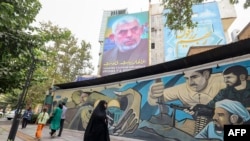With tensions simmering in the Middle East over fears of a wider war, U.S. President Joe Biden said Tuesday that he is "not giving up" on concluding a cease-fire deal that could avert a bigger conflict.
"It's getting hard," he told reporters about U.S., Egyptian and Qatari efforts to achieve a deal between Israel and Hamas, as he arrived in New Orleans.
The three mediators plan to convene what they hope will be a last push for a cease-fire at talks Thursday either in Cairo or Doha. But efforts could be derailed if Iran and its Lebanese proxy Hezbollah make good on a threat to retaliate against Israel for the assassinations of a top Hezbollah operative in Beirut and of Hamas political leader Ismail Haniyeh in Tehran. Israel has claimed the Beirut attack, but not the Tehran one, although Israel is widely presumed to have carried it out.
"We'll see what Iran does, and we'll see what happens if there is any attack," Biden said. "But I'm not giving up."
There are also concerns around reports that Israeli Prime Minister Benjamin Netanyahu has added to his demands for a cease-fire deal. His office denied the reports Tuesday, saying he did not introduce new terms, only "essential clarifications" for the deal's implementation.
Netanyahu has said he will send a delegation to Thursday's talks, but it was not yet clear whether Hamas would participate.
White House national security spokesperson John Kirby has warned that Israel and its allies must be prepared for "what could be a significant set of attacks" from Iran as soon as "this week."
Iran dismissed a joint call Monday from the leaders of Britain, France and Germany calling on Tehran to show restraint in its response to the killing of Haniyeh and expressing support for Israel in the face of possible aggression by Iran or its proxies.
In response to the rising tensions, U.S. Secretary of Defense Lloyd Austin on Sunday ordered the USS Georgia, a guided missile submarine, to the Middle East and told the USS Abraham Lincoln aircraft carrier strike group to accelerate its transit to the region.
At an U.N. Security Council meeting Tuesday, U.S. Ambassador Linda Thomas-Greenfield said the warships were dispatched as a precautionary measure and to aid Israel should it be attacked.
"But let me be clear: Our deployments of additional military assets are not a prediction of what is to come," she said. "A broader regional conflict is not inevitable. The United States' overall goal remains to turn the temperature down in the region, deter and defend against any future attacks, and avoid regional conflict."
She said that starts with finalizing a cease-fire and hostage release deal.
Meanwhile, as calls for restraint echoed around the region, Israel's far-right minister of national security, Itamar Ben-Gvir, defied an Israeli government ban and led hundreds of Israeli Jews on Tuesday to pray at a Jerusalem holy site sacred to both Jews and Muslims.
Ben-Gvir went to the al-Aqsa mosque compound and said Jews should be allowed to pray there. Similar visits by Israeli officials in the past have sparked violence between Israelis and Palestinians, and the prime minister's office quickly sought to set the record straight.
"This morning's incident on the Temple Mount deviated from the status quo," Netanyahu's office said in a statement, referring to the compound by its Jewish name. Muslims call it Haram al Sharif.
"Israel's policy on the Temple Mount has not changed; this is how it has been and this is how it will be," the statement said.
In Washington, Secretary of State Antony Blinken condemned Ben-Gvir's actions.
"These provocative actions only exacerbate tensions at a pivotal moment when all focus should be on the ongoing diplomatic efforts to achieve a cease-fire agreement and secure the release of all hostages and create the conditions for broader regional stability," he said.
Israel has vowed to destroy Hamas in retaliation for the Oct. 7, 2023, terror attack that killed 1,200 people and led to the capture of 250 hostages. Israel's counteroffensive has killed nearly 40,000 people in Gaza, mostly women and children, according to the Hamas-controlled Gaza Health Ministry, while Israel says the death toll includes thousands of Hamas fighters.
VOA's Patsy Widakuswara, Margaret Besheer, Nike Ching, Carla Babb and Natasha Mozgovaya contributed to this report. Some information for this report came from Reuters.







